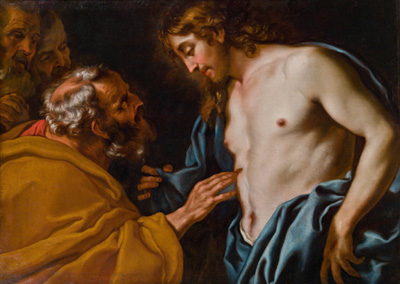I.Theme – Joining resurrection faith with experiences of community

"Incredulity of Thomas" – Duccio, di Buoninsegna (1308-1311)
The lectionary readings are here or individually:
Old Testament – Acts 4:32-35
Psalm – Psalm 133 Page 787, BCP
Epistle –1 John 1:1-2:2
Gospel – John 20:19-31
Commentary by Rev. Mindi Welton-Mitchell:
As we enter into the season of Easter, we read from the Acts of the Apostles, remembering how the early Christians fared in the days after Jesus’ resurrection. We hear the beginnings of the early church, the house-meetings, the agape love feasts, the witnesses and martyrs, and all of the disciples of Jesus.
Acts 4:32-35 recalls the beginnings of the church as also described in 2:42-47, but the message is even stronger that in the early church, the believers held all things in common–there were no possessions. The community’s purpose was to give testimony and witness to Jesus’ resurrection, and they lived out the commandment to love our neighbors as ourselves. For centuries since, we the church have attempted to recreate this fellowship and have fallen short. Our desire for what others have limits our relationships and comes into conflict with the desire of Christ, that we be one body, one church family, and that there be none among us in need.
The psalmist sings in 133 about they wondrous joys of being together in community, of being part of God’s family. God’s blessing is life forever, a life that is in communion with all of our brothers and sisters. Indeed, our practice of God’s family on earth is preparing us for the heavenly home we hope for–a home in which we are in fellowship, in community, with all those who have gone before us, with our brothers and sisters.
John 20:19-31 tells the familiar story of Jesus appearing the disciples after his Resurrection, and how they did not believe until they had seen. And there is the story of “Doubting Thomas.” Thomas is not unlike his brothers, he just was not present when Jesus showed his scars the first time. Perhaps Thomas is like most of us–we want to believe, but there are some things beyond our comprehension, things that blow apart the very understanding of how our world works: Jesus continues to turn the tables on our thinking, even in the resurrection.
The lectionary follows much of 1 John in the season of Easter. In this first portion, we are reminded that Jesus is the Word and the Light, and that through Christ we have forgiveness. There is nothing that can separate us from the love of God in Christ Jesus our Lord, as Paul reminds us in Romans 8; however, we also need to recognize that we all sin. If we say we are without sin, we are lying to ourselves. To walk the Christian path, we have to give fully of ourselves, and that requires our honesty. We need to recognize that we are all sinners, that we still sin, and that through Christ we are forgiven. We need to constantly recognize our need to turn back to God, for God is the light of the world, and what is hidden in darkness will be revealed in the light.
Perhaps this Sunday could be called “Doubters Sunday.” Celebrate the doubts that you have, for doubting is part of the journey of faith. Recognize that at times the whole resurrection story is a bit hard to swallow. Honor the times you have doubted God’s existence when there is so much pain and suffering in the world. Accept that at times the Bible does not seem to make sense. But also recognize that you and me are still sinners. Honor the fact that we need another chance to turn back, to set our lives on right paths again. Accept that we need God, we need Christ in our lives, because if nothing else, Christ shows us the path to be our true selves, to be honest before God and the world. Stripped away of the easy answers given to us in Sunday School and the blind acceptance we may have been taught to hold onto, we are naked before God. We can fake it for others–either our religious sincerity, or our all-knowledgeable ego that says we don’t believe that anymore–but we cannot fake it before the Creator. And if God’s created image is in us, we cannot fake it before ourselves. Before God, everything is stripped away, our doubts and fears, our blind acceptance–we simply come before God as who we are. Christ knows who we are, knows that we have our faults and shortcomings, and continues to love and accept us as children of God.
Read more




